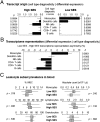Social stress up-regulates inflammatory gene expression in the leukocyte transcriptome via β-adrenergic induction of myelopoiesis
- PMID: 24062448
- PMCID: PMC3799381
- DOI: 10.1073/pnas.1310655110
Social stress up-regulates inflammatory gene expression in the leukocyte transcriptome via β-adrenergic induction of myelopoiesis
Abstract
Across a variety of adverse life circumstances, such as social isolation and low socioeconomic status, mammalian immune cells have been found to show a conserved transcriptional response to adversity (CTRA) involving increased expression of proinflammatory genes. The present study examines whether such effects might stem in part from the selective up-regulation of a subpopulation of immature proinflammatory monocytes (Ly-6c(high) in mice, CD16(-) in humans) within the circulating leukocyte pool. Transcriptome representation analyses showed relative expansion of the immature proinflammatory monocyte transcriptome in peripheral blood mononuclear cells from people subject to chronic social stress (low socioeconomic status) and mice subject to repeated social defeat. Cellular dissection of the mouse peripheral blood mononuclear cell transcriptome confirmed these results, and promoter-based bioinformatic analyses indicated increased activity of transcription factors involved in early myeloid lineage differentiation and proinflammatory effector function (PU.1, NF-κB, EGR1, MZF1, NRF2). Analysis of bone marrow hematopoiesis confirmed increased myelopoietic output of Ly-6c(high) monocytes and Ly-6c(intermediate) granulocytes in mice subject to repeated social defeat, and these effects were blocked by pharmacologic antagonists of β-adrenoreceptors and the myelopoietic growth factor GM-CSF. These results suggest that sympathetic nervous system-induced up-regulation of myelopoiesis mediates the proinflammatory component of the leukocyte CTRA dynamic and may contribute to the increased risk of inflammation-related disease associated with adverse social conditions.
Keywords: immunology; social genomics.
Conflict of interest statement
The authors declare no conflict of interest.
Figures




References
Publication types
MeSH terms
Substances
Associated data
- Actions
- Actions
- Actions
Grants and funding
- DE014320/DE/NIDCR NIH HHS/United States
- AG033590/AG/NIA NIH HHS/United States
- AG107265/AG/NIA NIH HHS/United States
- R01 MH097243/MH/NIMH NIH HHS/United States
- R01 AG034052/AG/NIA NIH HHS/United States
- R01 MH093473/MH/NIMH NIH HHS/United States
- CA116778/CA/NCI NIH HHS/United States
- R01 CA116778/CA/NCI NIH HHS/United States
- MH093473/MH/NIMH NIH HHS/United States
- R01 MH046801/MH/NIMH NIH HHS/United States
- R37 AG033590/AG/NIA NIH HHS/United States
- P30 AG017265/AG/NIA NIH HHS/United States
- P01 AG018911/AG/NIA NIH HHS/United States
- MH46801/MH/NIMH NIH HHS/United States
- R01 HD058502/HD/NICHD NIH HHS/United States
- HD058502/HD/NICHD NIH HHS/United States
- T32 DE014320/DE/NIDCR NIH HHS/United States
LinkOut - more resources
Full Text Sources
Other Literature Sources
Medical
Molecular Biology Databases

